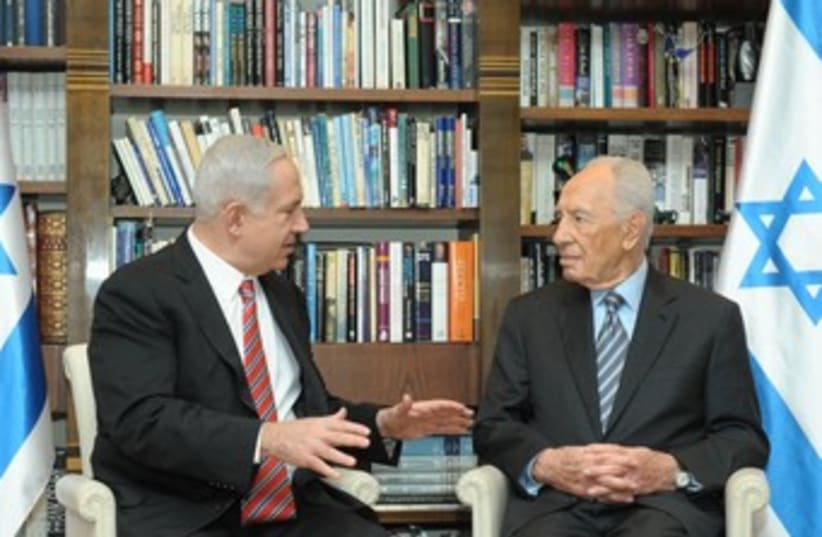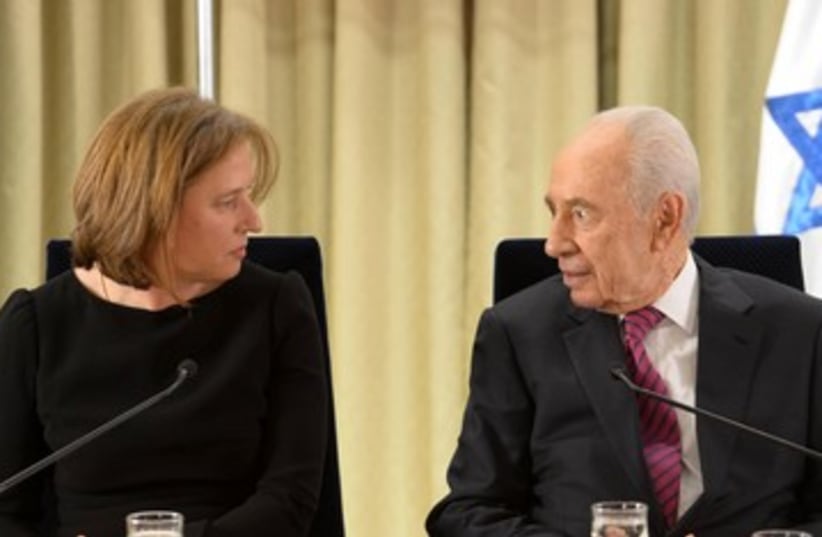
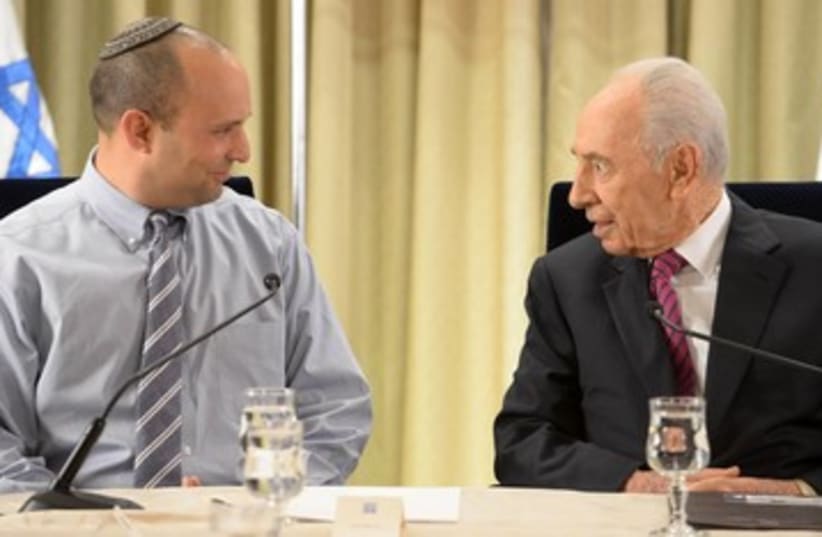
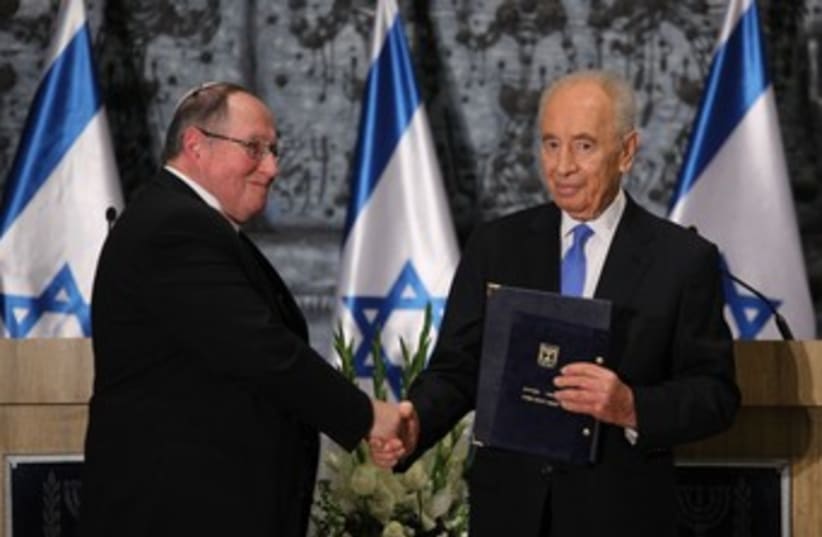
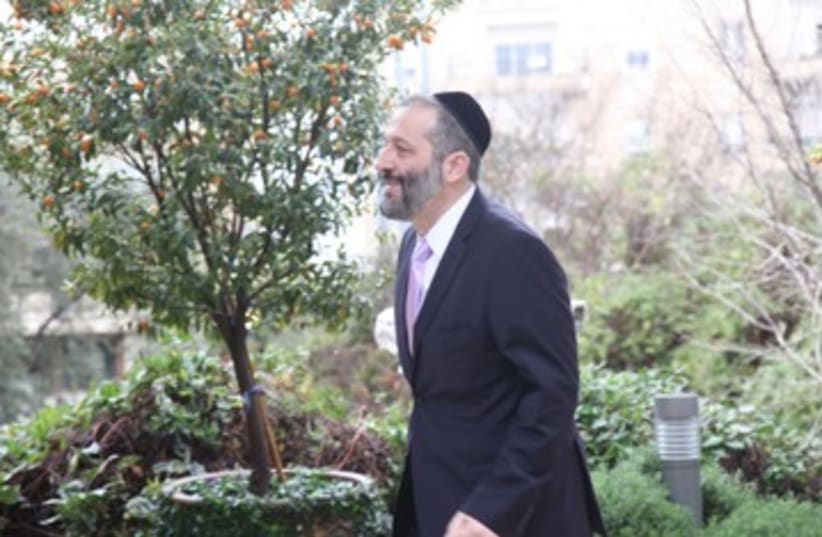
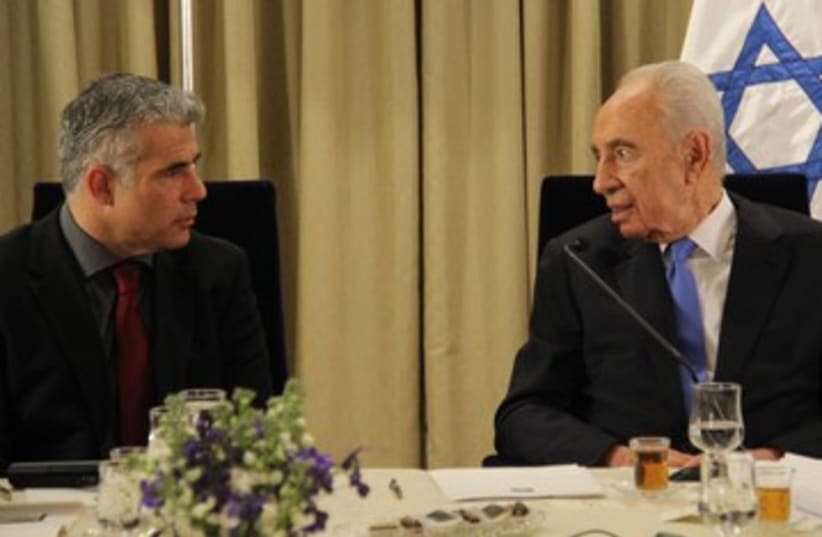
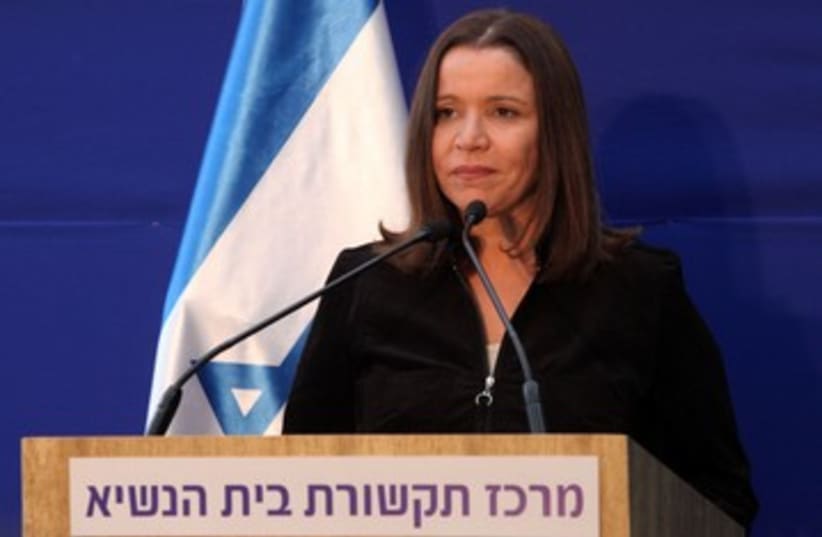
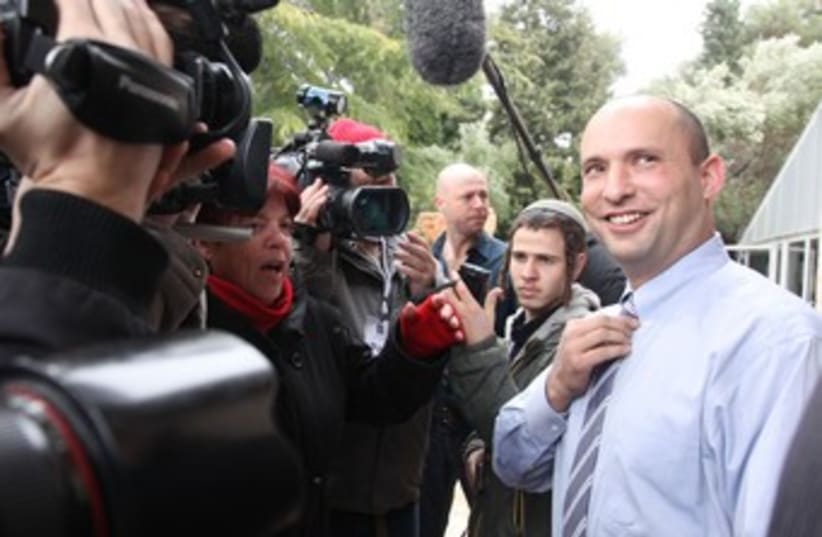

Meanwhile, likely coalition partners continued to discuss the next government before negotiations officially began.Foreign Minister Avigdor Liberman and Bayit Yehudi leader Naftali Bennett met Thursday night and discussed the budget, as well as equality in the burden of national service.They agreed to continue talking in the future.Liberman inquired as to Bennett’s willingness to join a coalition with Yesh Atid but without haredi (ultra-Orthodox) parties, or to form a bloc of religious and right-wing parties, leaving Yesh Atid out of the coalition, a Bayit Yehudi source said. The source would not divulge Bennett’s answer, explaining that the party was interested in joining the coalition, and it was Netanyahu’s job to decide who else he wanted to include.Yesh Atid leader Yair Lapid denied reports that he agreed to have 24 ministers in the next government, despite campaign promises that the number would be reduced to 18.“It doesn’t particularly bother me that people write that I agreed to a government with wasn’t even discussed, but there’s something sad about the way people hurry to announce they’re disappointed, and ‘we knew it,’ and ‘see, it was clear they would turn into politicians,’” Lapid wrote on his Facebook page.The Yesh Atid chairman added that the public had been disappointed so many times that “the hope we felt in recent days scares people instead of making them happy.”Lapid asked his supporters to ignore the spin and remember that much of what they read was rumors that people with interests were spreading in the weeks of coalition talks, when patience was essential.This past government was the largest ever, with 30 ministers; the smallest, in 1949, had 12.The last government with 18 ministers was in 1999.Netanyahu has 28 days to form a government once Peres appoints him to do so. If that is not enough time, the prime minister may ask for a 14-day extension, and many have requested even more time than that. The last government was formed after 49 days.There was little doubt that Netanyahu would be the one to form the next government, but Peres had to stick to the letter of the law and consult with each of the parties.Accordingly, on Thursday night, the president concluded a series of meetings with each of the Knesset’s 13 delegations, meeting last with Kadima, which has only two seats.The night before, he had met with Yesh Atid and a Likud Beytenu delegation.Peres, who was a minister in a Kadima-led government before his election to the presidency, congratulated Kadima chairman Shaul Mofaz and MK Yisrael Hasson for having waged a courageous battle, commenting that the party had been eulogized too soon.Mofaz was of the opinion that Kadima’s place was in the government because the government was facing so many internal and external challenges.These issues must be confronted by people with responsibility, wisdom and experience, which, he said, the two Kadima MKs definitely have.Bennett, for his part, recommended Netanyahu – as he said throughout his campaign he would do – telling the president that there were many areas in which his party could be useful.He said it was time for different sections of the nation to unite in order to solve problems.“The world is not waiting for us.We have to roll up our sleeves and solve Israel’s problems by ourselves.”Labor leader Shelly Yacimovich said that while it was a given, following announcements by the party, that Labor would not enter a Netanyahu-led coalition, “even those things which are self-evident must be said and were said.”Labor did not recommend anyone to form a government, but left the matter to the president’s discretion, saying the party would serve the public from the opposition.Yacimovich emphasized that she had nothing personal against Netanyahu and that this was simply a matter of ideological differences that could not be bridged. She also criticized Lapid’s decision to join the coalition, saying it did not bode well for the economically disadvantaged.Nonetheless, she added, Labor will support the government in matters of security and peacemaking, while continuing to remain an alternative to any incoming government.Both Shas and United Torah Judaism appealed separately to Peres to use all the influence at his disposal to prevent a rift in the nation. Both parties said they were convinced that if haredim who were genuine Torah scholars were forcibly drafted into the army and taken away from their Torah studies, it would cause such a rift.The haredi parties endorsed Netanyahu, who Shas co-leader Arye Deri believes will prevent other parties in the coalition from rejecting Shas.On the matter of looming budgetary cutbacks, Deri said his party understood the need for cutbacks, but that they should not come at the expense of the poor.Both Shas and UTJ were flexible about haredim who were not Torah scholars joining the army, but said that mutually acceptable solutions must be found.UTJ MK Ya’acov Litzman said that since the creation of the state, the national agenda had included allowing for whoever wanted to learn Torah to do so without disruption. If this changed, he warned, it could have catastrophic consequences.He said he regretted that the general public did not realize the extent of the contribution of Torah scholars.All were united in their fear that the attempt to conscript all yeshiva students would lead to the destruction of the country’s yeshiva world.Fellow UTJ MK Moshe Gafni noted that in all Knesset and government positions that members of his party had held, they had served the entire nation, not just their own sector.He said he was frankly worried about what could happen if the status quo were overturned with regard to army service exemptions.“We see what’s happening in the Arab states around us, and we do not want to see it emulated in Israel,” he noted, alluding to the Arab Spring. “We hope that the president takes up the challenge, because the future of the Jewish people is important to us.”Exemption from army service is not a new thing, Gafni pointed out, but dates back to biblical times, when half the people studied and half the people fought.Incoming UTJ MK Meir Porush also warned of the disaster that could befall the nation if “they try to disconnect us from Gemara [Talmud].”Tzipi Livni – whom Peres tasked with forming a government four years ago, but who failed – said that the meeting with the president was a mere formality in keeping with the law.The Tzipi Livni Party leader said she was resigned to the fact that there was only one candidate for prime minister, but she would not recommend him. It was too early at this stage, she explained, because her party did not know what the policy of the incoming coalition would be, and preferred to wait and to judge the new Netanyahu-led government on its performance.Of primary importance to Livni was taking the country out of political isolation and reviving peace negotiations with the Palestinians.Meretz likewise did not recommend any MK to the president.Meretz leader Zehava Gal- On expressed concern that “the coalition as it looks now will lead us to divisiveness.” She added that it was unfortunate that Lapid had chosen to side with Netanyahu instead of forming a Center-Left bloc.Because of his choice, she said, the incoming government will once again miss an opportunity for a two-state solution to the Israeli-Palestinian conflict.“We’ll be a fighting opposition,” she pledged.The United Arab List-Ta’al, Hadash and Balad, as expected, were not in favor of Netanyahu and did not recommend anyone.UAL-Ta’al MK Ahmed Tibi acknowledged that there were MKs better suited to the role than the current prime minister, but he declined to mention their names.All three parties complained to Peres about the lack of Arab integration in mainstream Israel, the rise of racism – particularly against Arabs in the Knesset and on the football field – and attempts to delegitimize Arab parties that were democratically elected to the parliament.UAL-Ta’al MK Ibrahim Sarsour voiced the hope that the 19th Knesset would not enact racist laws such as those he said had been introduced in the previous Knesset.Elections are an important aspect of democracy, added Tibi, but so is integration of minorities. Minorities can be part of the coalition or part of the opposition, he said – “but neither wants to include us.”Asked where the Arab parties stood on national service, he replied, “We will not agree to allow the war of the Jews to impinge on the Arabs.”He added that the Arab sector had many volunteer projects that benefitted the community and which it wanted to continue, but not under the rubric of national service.Hanna Swaid of Hadash, whose party includes Jews as well as Arabs, said that the Arab community was greatly distressed on hearing of attempts to bar Arabs from the country’s decision-making process by eliminating them from the political spectrum. He also condemned what he termed “antidemocratic behavior in the Knesset.”Balad’s Jamal Zahalka also spoke out against racism in the Knesset, the destruction of Arab homes, and Arab homes having no electricity, as well as discriminatory practices against Arab residents of the Negev. He asked Peres to put an end to the racism.He also complained about Lapid bad-mouthing his fellow party member MK Haneen Zoabi.For her part, Zoabi said she had never entertained high expectations of Lapid, and now she could see she had been right.“He doesn’t believe in equality, and he showed his true face,” she said.
